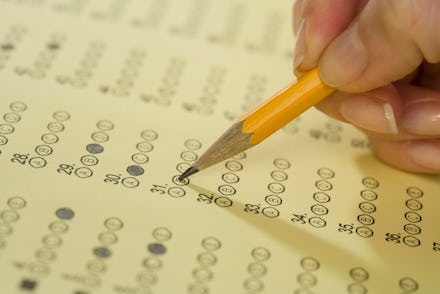Watch an Impressive Fourth-Grader Call Out All the Problems with Standardized Testing

It's a rare student who enjoys sitting through a standardized test. The tedious ordeal is saddled with expectations, and the regimented ways with which the tests are given are enough to drive anyone up the wall. Not only that, but they unfairly try to peg a student's entire worth to a single arbitrary number.
Nine-year-old Sydney Smoot knows that pain well, and during a recent school board meeting in her hometown of Brooksville, Florida, she put the flawed system on blast.
"This testing looks at me as a number," she told the crowd of adults as she stood behind a podium clad in a jean jacket and pink dress. "One test defines me as either a failure or a success through a numbered rubric. One test, at the end of the year, that the teacher or myself will not even see the grade until after the school year is already over."
Amusingly, the adults sitting behind Smoot couldn't contain their astonishment at her poise — after all, most children her age are focused on things besides complex national debates that continue to flummox even the most hardened lawmakers. Yet there she was, delivering takedown after takedown in a neat, three-minute speech. By the end, the crowd was on its feet.
"If you know my daughter, you'd know she's very outspoken," her mother, Jennifer Smoot, told the Tampa Bay Times.
Standardization is everywhere: Smoot was speaking about the Florida Standards Assessments, a series of standardized tests for K-12 students, but the Sunshine State's system mirrors that of many other states across the country.
In fact, every state in the country has some form of across-the-board examination for public schools, partly due to federal laws like the No Child Left Behind Act of 2001, the brainchild of former President George W. Bush, which mandates that fourth- and eighth-graders must be tested in math and reading every two years. Other laws, like the Elementary and Secondary Education Act of 1965, connect standardized tests to federal funds, which effectively ties the hands of state education agencies.
As Mother Jones' Titania Kumeh wrote in 2011, "If you're thinking that students are now getting tested more than ever, you'd be right."
"This testing looks at me as a number."
The tests are problematic. There's been a great deal of back and forth about standardized tests, particularly the Common Core State Standards Initiative, which is an even more uniform system thus far adopted by 43 states.
Advocates say that they work as an equalizer and hold every student — and thus every school — to the same standard. They also argue that holding students and their teachers accountable in the form of test scores ensures that schools place the right amount of emphasis on education.
But detractors like Sydney Smoot have become much louder in recent years, especially after the passage of No Child Left Behind and the development of the Common Core. They point out that such testing can induce extreme anxiety due to the stress placed upon high performance. Moreover, since some tests — like Florida's — are brand new, states are forced to use unlucky students as guinea pigs.
Of new, untested methods, Education Secretary Arne Duncan said in 2013, "We're trying to be very, very thoughtful about it. ... When we get to the other side, I think the country will be in a radically better place, but we have to get there."
There's also the question of the racial and socio-economic gaps in standardized test results. According to the National Educational Organization, "Differences between the scores of students with different backgrounds (ethnic, racial, gender, disability, and income) are evident on large-scale standardized tests."
The achievement gap between student groups continues to persist, and while advocates may claim that standardized tests close this gap, the fact that it remains suggests this isn't the case.
Not every child may be able to speak as eloquently about standardized tests as Smoot, but chances are she's not the only one who feels this way — and with good reason.
"I felt proud of myself for taking a stand and standing up for all those students that had to take this FSA test," she told Bay News 9.